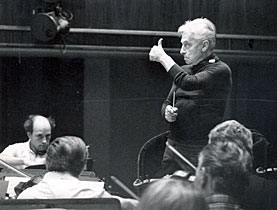Lucerne festival steps into rhythm

The Lucerne music festival, which is marking its 70th anniversary, is exhorting listeners to "feel the rhythm tingling in their toes" with a focus on dance.
Well established and with an international reputation, the event has come a long way since its beginnings, when it emerged as an alternative to festivals such as Salzburg during the Nazi era.
The summer festival, which opened in the picturesque central Swiss city on Wednesday, is Switzerland’s second most popular after the Montreux Jazz Festival.
Dance has been chosen as a theme because for many people it is a separate form of expression to music, says director Michael Haefliger in his festival introduction.
The Ancients made no such distinction and looking at the roots of these cultural phenomena, “it quickly becomes clear that music and dance are two sides of the same coin”, he adds.
Filling the programme is a wide range of dance-influenced music, from ballet to contemporary. Stars from the dance world will also be present.
“We have the German choreographer, dancer and director Joachim Schlömer as artiste- étoile. He will show four productions this year including Mozart’s Abduction from the Seraglio with dancers,” Barbara Higgs, head of public relations at the festival, told swissinfo.
Other highlights include the ballet classic, Sacre du Printemps by Igor Stravinsky, and folk dances from Antonín Dvořák and Maurice Ravel.
Traditional favourites
Visitors can also expect to see top orchestras and old favourites, such as the Cleveland Orchestra and the Vienna Philharmonic.
Claudio Abbado and the Lucerne Festival Orchestra once again opened the event.
Also appearing is conducting prodigy Gustavo Dudamel and his Simón Bolívar Youth Orchestra of Venezuela, who will be returning to Lucerne after wowing audiences with a passionate and energetic debut last year.
Soloists will also get their chance to shine. “The wonderful oboist Albrecht Mayer from the Berlin Philharmonic, also an artiste-étoile, will perform a range of music from baroque to contemporary which will show his considerable skills,” said Higgs.
The festival is 70 years old this year. Although no big celebrations are being planned – they might come for the 75th says Higgs – there will be a special broadcast on Swiss television on August 22.
The summer programme, which includes around 100 events this year, is much expanded since the first concert in 1938.
Festival beginnings
Held in August of that year, it was conducted by the Italian Arturo Toscanini, considered one of the best maestros of all time, and took place in front of composer Richard Wagner’s former residence in Tribschen, a suburb of Lucerne.
Such was its success that the organisers decided to create a festival. The political situation also had an influence.
After the established music festivals of Salzburg and Bayreuth came under the influence of the Nazis, many musicians were unable – for religious or ideological reasons – to take part, coming instead to Lucerne.
The festival orchestra was established in 1943, attracting such greats as Herbert von Karajan.
The late Austrian conductor’s long association with Lucerne was honoured earlier this year with a celebration marking the centenary of his birth.
More than 100,000 visitors now come to Lucerne each year for the Easter, Summer and At The Piano sections of the festival.
This year Haefliger, who has been in charge for nine years, says he hopes that the audience will enjoy a “voyage of discovery”.
“We hope you can already feel the rhythm tingling in your toes!” he said.
swissinfo, Isobel Leybold-Johnson
The Lucerne festival is divided into three parts:
In Summer: August 13-September 21, 2008
At The Piano: November 17–23, 2008
At Easter (next year): 28 March – April 5, 2009
The concerts take place in the impressive acoustics of the Jean Nouvel-designed Culture and Convention Centre, on the lakeside.
From 1943 till 1993 the Swiss Festival Orchestra, composed of the best of Swiss musicians, had a formative influence on the Lucerne Festival.
It was revived again in 2003. Under Italian conductor Claudio Abbado, its composition is now more international, but still top notch.
Abbado and the musicians meet at the beginning of each August in Lucerne for rehearsals and open the Lucerne Festival in Summer.
This year they will present two programmes and give five concerts. The first three are of French music from Debussy, Ravel and Berlioz and the final two include Russian works by Tchaikovsky, Rachmaninoff and Stravinsky.

In compliance with the JTI standards
More: SWI swissinfo.ch certified by the Journalism Trust Initiative











You can find an overview of ongoing debates with our journalists here . Please join us!
If you want to start a conversation about a topic raised in this article or want to report factual errors, email us at english@swissinfo.ch.